


Did you know that a seemingly simple app can transform industries and create billion-dollar empires overnight? The world of app development is filled with untold stories of genius breakthroughs that have reshaped how we live and work.
In our ever-evolving digital age, app development isn't just about coding—it's a high-stakes, fast-paced realm where innovation reigns supreme. And the potential impact is greater now than ever before.

One might assume app development is strictly the domain of Silicon Valley, but the truth is that innovation hubs are sprouting worldwide, challenging stereotypes and flipping the status quo. Particularly mind-bending is how some regions, traditionally overlooked, are spearheading cutting-edge projects that rival any Western tech giant. But that’s not even the wildest part…
Consider this: app developers now have access to unprecedented tools and frameworks, enabling them to turn wild visions into reality at warp speed. These technologies are not just enhancing app functionality but are also setting the stage for a digital revolution. What if I told you there's a hidden layer of this story that’s reshaping the very essence of creativity? But that’s not even the wildest part…
What happens next shocked even the experts. How could a new wave of technology alter everything we know about app design and functionality? Stay tuned as we dive deep into the exciting journey of app development and uncover how this digital revolution is unfolding.
While high-profile apps grab headlines and consumer dollars, much of the innovation in development happens behind the scenes. The unsung heroes—those hidden figures in the app industry—defy conventional wisdom and forge their paths. These developers are crafting mind-blowing features that even veteran tech insiders had deemed impossible. Their secret? A relentless pursuit of continuous improvement intertwined with a willingness to embrace failure. But there’s one more twist to this tale…

One of the best-kept secrets in app success is the use of data analytics and machine learning to predict user behavior. Developers are now leveraging these technologies to such an extent that apps almost seem to anticipate what the user wants before they realize it themselves. This is not simple magic but a calculated use of algorithms that rivals the intuition of human creativity. Could this predictive power be the future of app development? The next chapter might just make you rethink everything.
Another surprising aspect of successful apps is their commitment to inclusivity and accessibility. Amid rapid technological advancements, some developers are focusing on universal design to ensure accessibility across all devices and demographics. This not only democratizes technology but also creates a more inclusive digital space. Still, many aren't aware of the profound impact these features have on the user experience. What you read next might change how you see this forever.
And then, there’s the DIY app movement—unlocking creativity among individuals with little to no coding skills. Platforms that offer drag-and-drop functionalities allow anyone to sketch out their app ideas and bring them to life. Their importance cannot be overstated, as these tools are adapting the app ecosystem for a new generation of creators. What if the next big app isn't crafted by a team of seasoned programmers but by a passionate amateur? Could it all come down to a matter of time before this trend dominates the field?
In the battle of modern app development, the right tools can make all the difference. Emerging frameworks like React Native and SwiftUI are not only speeding up the development process but also empowering creators to build native-like apps effortlessly. These tools have transformed the playing field, leveling it for newcomers and experienced developers alike, who want to bring their imaginations to life. But there's more to this seismic shift than meets the eye...

The art of app development has become increasingly collaborative, with tools like GitHub and Jira allowing teams to work seamlessly across time zones and distances. The barriers that once prevented collaboration have all but disappeared, fostering an era of globalization where the freshest minds can contribute regardless of geographical location. Yet, beneath this well-oiled machine, there are insights that few are willing to share. So, what secrets do these tools hold?
APIs (Application Programming Interfaces) are often overlooked but play a crucial role in connecting and expanding app functionalities. The power of APIs is so immense that developers can now utilize them to create seamless experiences by integrating different technologies effortlessly. However, only a handful truly leverage the potential of these powerful connectors, creating a competitive advantage that many fail to capitalize on. Maybe it’s time we dig deeper into this aspect of development?
Parallel to the tools themselves is the significant rise of the open-source community. Developers around the globe are contributing to vast repositories of code, allowing others to build and iterate on their templates. This burgeoning movement stands to reshape what we understand about ownership and intellectual property in app development. Could this open-source philosophy herald an entirely new age of innovation?
If you think augmented reality (AR) is just for games and entertainment, think again. AR apps are making their mark across industries, from healthcare to retail, offering immersive experiences that transform how users interact with technology. These applications are not just adding layers of digital flair but are profoundly altering business models along the way. What if AR is the next frontier in digital interaction?
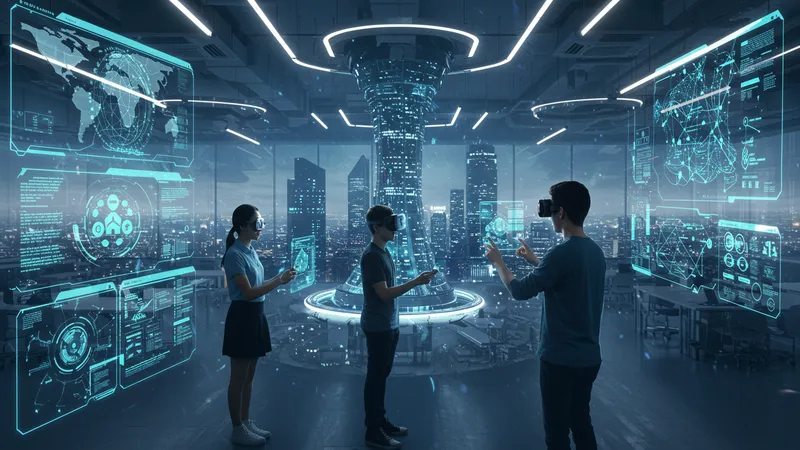
Merely a few years ago, AR seemed like a futuristic dream, yet today, practical applications are becoming mainstream. In education, for instance, AR is empowering interactive learning by allowing students to engage with content tangibly and dynamically. This revolution in teaching methodology could redefine educational paradigms, making learning more engaging and effective. But are we fully scratching the surface here?
Retail sectors are also cashing in on AR's potential, creating "try before you buy" experiences that revolutionize customer satisfaction. Brands are replacing traditional shopping methods with engaging, virtual alternatives that put the power of information and visualization at shoppers’ fingertips. The implications for consumer behavior and purchasing patterns are profound and could change forever. Are we standing on the brink of a retail renaissance?
Beyond commercial uses, AR's applications are extending into public sectors like urban development and safety, offering solutions for better planning and operational efficiency. Cities are testing AR-based navigation systems that provide real-time information and guidance, making urban environments more accessible and less daunting. Could AR soon become the invisible hand guiding us through life’s complexities?
In a world where data is the new oil, app security stands as a critical factor more than ever. High-profile hacks and data breaches have left companies scrambling to update their security measures. Developers are now integrating robust security protocols right from the initial stages of app development. But is the emphasis on security stifling creativity, or is it a necessary safeguard?

Current technological advances allow for tighter encryption and multi-factor authentication processes that bolster user trust. However, the complexity of these measures sometimes forces developers to make tough trade-offs between leisurely user experience and fortified security. Still, new emerging technologies are stepping up to balance the scale. Will these advancements redefine what we expect from secure apps?
A shift is underway as the emphasis moves toward transparency. Developers are building apps that clearly communicate their security practices to users, thereby fostering a culture of trust. Yet, there’s an undercurrent of skepticism as users become more privacy-conscious. Are we approaching an era where digital transparency becomes non-negotiable?
Beyond traditional security considerations, the advent of blockchain is making waves in app development. This distributed ledger technology is poised to revolutionize in-app transactions, traceability, and compliance with unprecedented levels of transparency and security. Will blockchain obliterate trust issues in app transactions? It could be the dawn of a cryptographically secure app landscape.
Artificial intelligence (AI) has started to redefine how apps operate, ultimately transforming user experience on numerous levels. AI's ability to process information and predict user behavior has created apps that feel almost human. Although AI in app development is hailed as a game-changer, its implications go far beyond just new functionalities. What if AI is on the brink of not just predicting but altering user behavior?

Today’s businesses are no longer confined to static interfaces, thanks to AI-powered chatbots that can interact with users in real-time, addressing queries and providing instant support. These digital assistants have already shown their immense value in customer service, but their capabilities and roles are evolving each day. Could this be the beginning of a seamless blend of human and machine-led interactions?
While AI is powering innovation, it’s also introducing ethical dilemmas concerning data privacy and algorithm bias. Developers are grappling with these challenges, facing pressure to craft ethically sound algorithms that don't compromise user values. As AI continues to innovate rapidly, will the ethical frameworks keep pace to ensure tech utopia instead of a dystopian nightmare?
The AI revolution also extends to personalization, offering experiences tailored to individual preferences with unprecedented precision. This hyper-personalization spells massive opportunities for brands while raising questions about autonomy and choice. Is hyper-personalization the key to user engagement, or does it flirt too closely with manipulation?
UX (User Experience) design has become paramount in app development, emphasizing not just aesthetics but also how users interact with digital products. Modern-day UX isn’t just functional—it’s deeply immersive, aiming to pull users into a seamless digital environment. As UX defines the commercial viability of apps, could it also redefine what users demand from technology?
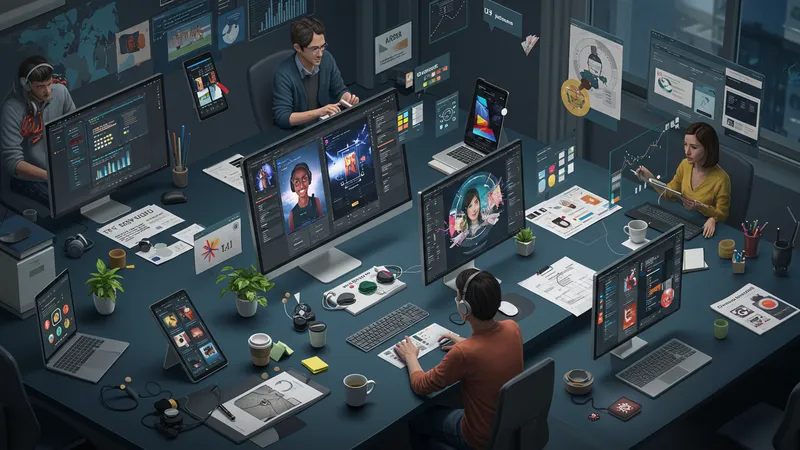
Today’s users expect intuitive, cohesive interactions that make life easier, and the pressure is on developers to meet these expectations. From emotional design that taps into user sentiments to gamification that boosts engagement, how can developers leverage these techniques to build not just products but experiences? The obsession with UX could alter not only app development but also the culture of user expectations.
Interestingly, the focus on UX is driving developers to tap into behavioral sciences to understand the psyche of users better. By incorporating principles from psychology and cognitive sciences, apps are no longer mere digital tools, but evolved entities that relate to user emotions and preferences. Will the merging of technology and psychology create products that are not just smart but empathetic?
Feedback loops are vital for refining the UX, informing future iterations of the app continuously. Developers who ignore this continuous exchange risk falling behind. In an age where user feedback is a currency, how quickly can developers adapt before being eclipsed by more agile competitors? The UX evolution is more than a trend—it’s a survival strategy.
The monetization landscape in app development is undergoing a seismic shift, as developers experiment with new revenue models that prioritize long-term engagement over short-term gains. From subscription services to in-app purchases, there’s no one-size-fits-all approach. App developers are becoming more creative, crafting monetization models that align with user expectations while maximizing revenue. Are these evolving strategies the silver bullet for app profitability?
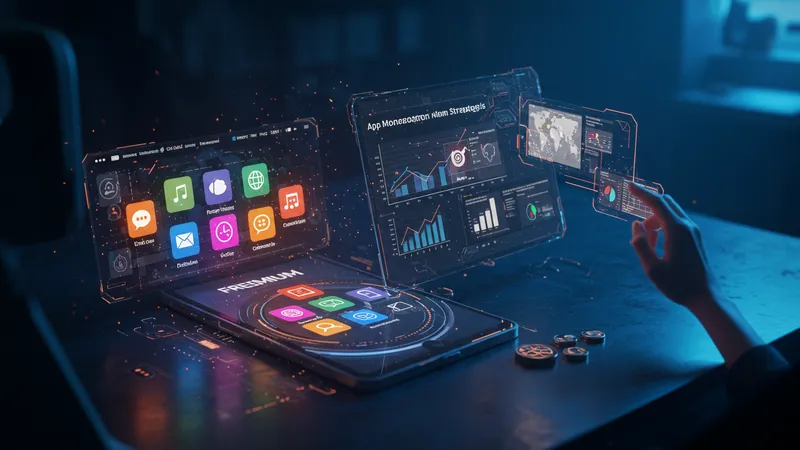
One of the most notable trends is the freemium model, allowing users to access basic features for free while charging for premium content. This approach has taken the app world by storm, ensuring wider reach while enticing users to pay for enhanced functionalities. Do these freemium models represent the future of app success by bridging the gap between accessibility and exclusivity?
Another innovative approach is the integration of gamification elements into monetization strategies. By incorporating challenges, leaderboards, and rewards, apps are transforming user engagement from transactional to experiential, creating brand loyalty like never before. Could gamification hold the key to unlocking higher levels of user retention and conversion?
More recently, the emphasis on ethical monetization has gained traction. Developers are moving away from intrusive ads that disrupt the user experience, instead opting for more subtle, efficient techniques that align with user needs. This marks a shift towards user-centric monetization strategies, raising questions about how best to balance profitability and responsibility. Will this ethical approach form the backbone of future monetization models?
As the world prioritizes sustainability, app developers are increasingly asked to understand and mitigate their ecological impact. While the digital world is often perceived as carbon-neutral, the reality is considerably different. Strategies to optimize energy consumption and resource management are now becoming industry norms. But how can developers effectively incorporate sustainability without sacrificing performance?

A shift towards green coding practices, which optimize for energy efficiency, has seen developers actively reduce their carbon footprint. The focus is on minimizing resource usage, from cloud storage to streamlined code execution. Yet, the most successful apps balance these environmental considerations with user expectation. Is green coding the way forward for responsible development?
Sustainable app development also focuses on extending the lifecycle of digital products. Unlike traditional software that can quickly become obsolete, sustainability demands a long-term vision, ensuring apps remain relevant and operationally efficient. This paradigm shift is not just about reducing waste but also strategically planning for continuous adaptation. How will this ‘building for longevity' impact innovation cycles?
Beyond coding practices, sustainability is influencing app hosting choices, as firms opt for servers powered by renewable energy. The rise of eco-friendly server farms provides a cleaner alternative and is rapidly gaining popularity. Could this shift be the catalyst that drives widespread eco-conscious practices in the app industry?
App development, at its core, is a societal force, subtly shaping behavior, culture, and social norms. From altering communication styles with messaging platforms to transforming transportation with ride-sharing apps, the societal impact is profound. Yet, this influence often goes unnoticed. How does this power to shape societal norms challenge the responsibility of developers?
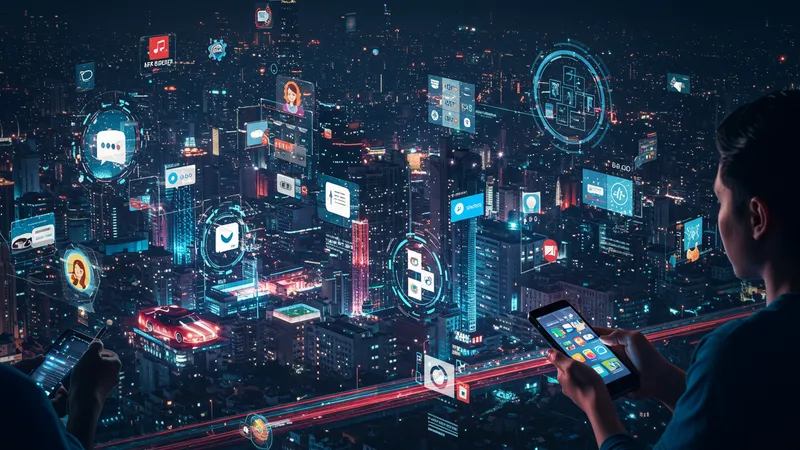
Digital literacy has risen as a result of app ubiquity, with more individuals gaining tech savviness across global demographics. Apps are not only facilitating digital accessibility but are also serving as launching pads for further technological pursuits among users. Is this rise in digital literacy fostering a new wave of tech-enabled empowerment?
Intriguingly, the rise of niche apps focused on self-care, mental health, and wellness reflects broader societal shifts towards holistic well-being. These apps address everyday challenges and facilitate lifestyle improvements on personal levels. Empowering users to strive for wellness as an accessible goal showcases how developers are tapping into profound cultural and societal shifts. But does this responsibility demand ethical oversight?
However, apps can also perpetuate societal ills, such as creating digital fatigue and exacerbating consumerism. As these negative consequences become more evident, developers and users alike grapple with creating a more conscious digital ecosystem. Can awareness and ethics guide the role of apps in society towards more positive, impactful ends?
As we stand on the cusp of future technological developments, the prospects for app development are boundless. With advances in quantum computing and 5G technology, the stage is being set for a new generation of apps that seem unimaginable today. The unprecedented computing power will revolutionize capabilities, tackling problems previously deemed impossible. Could this ignite an era of rapid digital evolution?

The convergence of technologies promises transformative solutions, as AI, AR, and IoT come together to create seamless, interconnected ecosystems. This unison portends a future where services and experiences blend seamlessly, confronting existing realities with possibilities straight out of science fiction. Could this convergence redefine the boundaries of ingenuity?
As the landscape of app development broadens, educational institutions and industry leaders are taking note, cultivating skills aligned with future tech demands. From coding bootcamps to university programs embracing interdisciplinary studies, the next wave of app developers will likely be more equipped and versatile than ever before. Have we fully grasped the implications of this new era of digital education?
The role of developers is shifting from creators to curators, as autonomous technologies begin to produce self-sufficient ecosystems. Automation and smart algorithms could soon do much of the heavy lifting in app development, encouraging developers to explore uncharted territories. Will the future of app creation be one of even greater creativity and freedom?
Amidst rapid technological advancement, it’s easy to forget that, at its core, app development is a deeply human endeavor. It involves creative minds channeling innovation to transform our digital landscape. But as tensions rise between roles of technology and humanity, the question becomes: How will developers balance innovation with the preservation of fundamental human values?
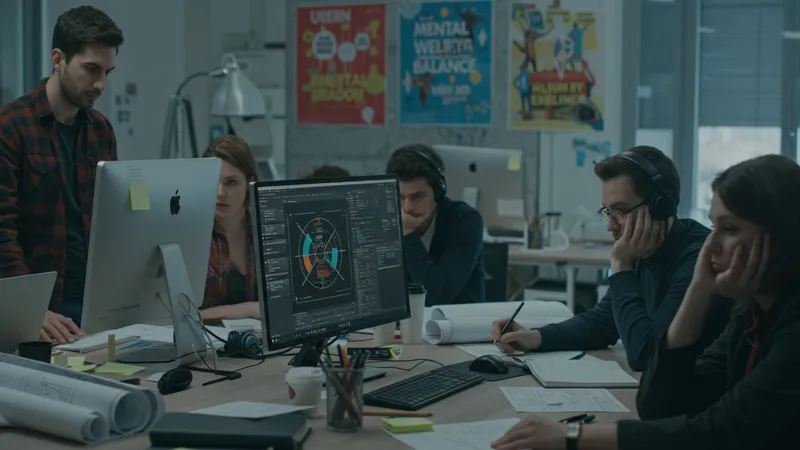
The demands of app development often lead to intense pressures, resulting in burnout and mental health challenges for those within the industry. Initiatives aimed at bolstering mental well-being and improving work-life balance are gaining momentum, recognizing that the sustainability of human resources is as integral as technological progress. Is the call for human-centered workplace policies finally catching up with the pace of technology?
The story behind the code often involves substantial collaboration, as diverse teams merge technical expertise and creative intuition. Apps are reflections of collaborative genius more than individual prowess, showcasing how teamwork across disciplines fuels innovation. Could such collaborative synergies become the future norm in the tech sector?
With dialogues around inclusivity growing, the emphasis on diversity in tech teams is greater than ever. By infusing varied perspectives into the development process, apps can become more innovative and better suited to diverse user bases. How will this deepening focus on diversity drive the future of app development, and are there lessons to be learned beyond the tech industry?
App developers are increasingly tasked with enhancing accessibility, crafting solutions that cater to users with diverse abilities. The challenge rests in meeting accessibility standards while ensuring apps remain visually appealing and user-friendly for everyone. How can developers pioneer inclusive designs without compromising the aesthetic allure?

Accessibility covers more than just visual design. Voice-controlled functionality, for instance, is evolving rapidly to serve as an essential tool for those with visual and physical impairments. This technology also benefits hands-free interfaces, catering to all users working in scenarios where traditional interaction isn't feasible. What might be the next breakthrough in accessibility innovation?
From conception to production, embracing accessibility is pushing developers to think differently, spurring out-of-the-box solutions. It champions a culture where apps not only sustain but flourish through inclusivity—a departure from exclusionary practices of the past. Could this very democratization help apps reach underserved markets, expanding their influence globally?
AI holds promise as an enabler of accessibility within apps, automating personalization to user needs with ease. AI-driven applications could fine-tune interfaces on the fly, adapting to each individual's requirements in real-time. How might this herald a new, even more inclusive era for app development—and society at large?
The app launch process, a carefully orchestrated event, holds the key to an app’s success or demise. Despite its importance, many developers see all their hard work fall short due to suboptimal launch strategies. Building pre-launch momentum is crucial, yet fraught with challenges and opportunities. Are there untapped tactics waiting to be discovered for the perfect launch?

Creating buzz through intelligently crafted teasers and beta testing phases offers preliminary insights and helps garner an initial user base, fueling organic growth once the app goes live. These approaches can engage potential users and help refine the final product. How can developers ensure they're capitalizing on this valuable feedback to the fullest?
Partnerships and collaborations can amplify launch efforts, tapping into existing user bases that align with the app’s target demographic. Leveraging influential networks can dramatically expand an app’s reach and credibility from the outset. Will strategic alliances become a cornerstone of a successful app launch strategy?
In an age where app stores are overpopulated, differentiating product offerings is increasingly essential. Building unique value propositions and offering solutions to unreached pain points can spell the difference between obscurity and success. What niche opportunities stand unnoticed yet could potentially redefine the next app launch success story?
Ultimately, app development is not just an exercise in technology but a testament to the limitless possibilities of human ingenuity. The lessons of today ensure the innovations of tomorrow, continually reimagining what is possible. As we delve deeper into this digital age, one thing remains clear: the journey is just beginning.
Share this article with your friends, bookmark it for insights, or take your ideas forward by experimenting with the tools you’ve discovered here. Every click fuels the future of technological innovation!